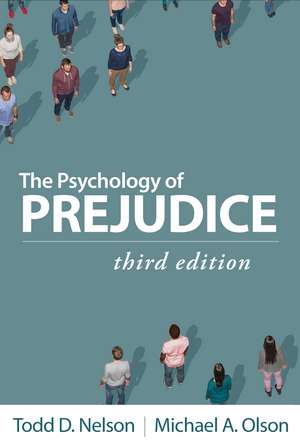The Psychology of Prejudice, Third Edition
Autor Todd D. Nelson, Michael A. Olsonen Limba Engleză Paperback – 2 feb 2024
New to This Edition
*Full chapter on implicit prejudice.
*Chapters on anti-gay and anti-fat prejudice.
*New or updated discussions of timely topics: how children develop prejudice, structural racism, benevolent versus hostile sexism, how contact reduces prejudice, and more.
Preț: 428.74 lei
Preț vechi: 466.02 lei
-8% Nou
Puncte Express: 643
Preț estimativ în valută:
82.05€ • 85.55$ • 68.19£
82.05€ • 85.55$ • 68.19£
Carte disponibilă
Livrare economică 28 februarie-14 martie
Livrare express 13-19 februarie pentru 43.80 lei
Preluare comenzi: 021 569.72.76
Specificații
ISBN-13: 9781462553235
ISBN-10: 1462553230
Pagini: 472
Dimensiuni: 178 x 254 x 24 mm
Greutate: 0.82 kg
Ediția:3rd edition
Editura: Guilford Publications
Colecția Guilford Press
ISBN-10: 1462553230
Pagini: 472
Dimensiuni: 178 x 254 x 24 mm
Greutate: 0.82 kg
Ediția:3rd edition
Editura: Guilford Publications
Colecția Guilford Press
Notă biografică
Todd D. Nelson, PhD, is Professor of Psychology at California State University, Stanislaus. His research focuses on prejudice and stereotyping, with special emphasis on ageism. A Fellow of the Society for Experimental Social Psychology, Dr. Nelson has authored or edited a number of books on social psychology, prejudice, and ageism.
Michael A. Olson, PhD, is Professor of Psychology at the University of Tennessee. Much of his research centers on implicit bias, measures of implicit cognition, prejudice reduction, and intergroup relations. He also advocates for and conducts training sessions on diversity, equity, and inclusion. Dr. Olson is past associate editor of Personality and Social Psychology Bulletin and the Journal of Experimental Social Psychology.
Michael A. Olson, PhD, is Professor of Psychology at the University of Tennessee. Much of his research centers on implicit bias, measures of implicit cognition, prejudice reduction, and intergroup relations. He also advocates for and conducts training sessions on diversity, equity, and inclusion. Dr. Olson is past associate editor of Personality and Social Psychology Bulletin and the Journal of Experimental Social Psychology.
Cuprins
1. Introduction to the Study of Stereotyping and Prejudice
2. Origin and Maintenance of Stereotypes and Prejudice
3. Feeling versus Thinking in the Activation and Application of Stereotypes
4. Implicit Stereotyping and Prejudice
5. The Prejudiced Personality: Are Some People More Likely to Feel Prejudice?
6. Old-Fashioned versus Modern Prejudice
7. Experiencing Prejudice
8. Ageism
9. Sexual Prejudice
10. Sexism
11. Anti-Fat Prejudice
12. Reducing Prejudice
References
Index
2. Origin and Maintenance of Stereotypes and Prejudice
3. Feeling versus Thinking in the Activation and Application of Stereotypes
4. Implicit Stereotyping and Prejudice
5. The Prejudiced Personality: Are Some People More Likely to Feel Prejudice?
6. Old-Fashioned versus Modern Prejudice
7. Experiencing Prejudice
8. Ageism
9. Sexual Prejudice
10. Sexism
11. Anti-Fat Prejudice
12. Reducing Prejudice
References
Index
Recenzii
"I look forward to using Nelson and Olson's book as the primary text in my undergraduate courses on stereotyping, prejudice, and intergroup relations. The book is easy to read, covers a century-long history of social-psychological research on stereotyping and prejudice from several perspectives (for example, personality versus situational antecedents, implicit versus explicit measures, perceiver's versus target's experiences), and addresses prejudice in different intergroup contexts, including race/ethnicity, gender, sexual orientation, age, and body size. I particularly like the discussion questions at the end of each chapter, which will help students truly engage with the material and with one another."--Kimberly Rios, PhD, Department of Psychology, University of Illinois at Urbana–Champaign
"What sets this text apart is its integration of real-world examples with psychological theories and empirical evidence to provide a comprehensive framework for understanding prejudice. The third edition is meticulously updated and enriched with the latest research and contemporary examples. By delving into the psychological mechanisms at play, the text offers profound insights into why prejudice persists and how it can be effectively addressed to foster a more inclusive and equitable society. This is an indispensable text for undergraduate courses on the psychology of prejudice."--Jeff Stone, PhD, University Distinguished Professor of Psychology and Psychiatry, University of Arizona
"This book offers a comprehensive examination of the study of intergroup bias. While much of the literature in the field focuses on Black–White relations, the third edition also addresses sexism, ageism, heterosexism, and anti-fat prejudice, detailing the nuances associated with different forms of prejudice. Importantly, the final chapter is devoted to the reduction of prejudice. I appreciate the way the book discusses the historical foundations of this work while also bringing us up to date on contemporary perspectives and questions. This book is a perfect companion for all students of prejudice, regardless of their career stage."--Keith B. Maddox, PhD, Department of Psychology, Tufts University-
"What sets this text apart is its integration of real-world examples with psychological theories and empirical evidence to provide a comprehensive framework for understanding prejudice. The third edition is meticulously updated and enriched with the latest research and contemporary examples. By delving into the psychological mechanisms at play, the text offers profound insights into why prejudice persists and how it can be effectively addressed to foster a more inclusive and equitable society. This is an indispensable text for undergraduate courses on the psychology of prejudice."--Jeff Stone, PhD, University Distinguished Professor of Psychology and Psychiatry, University of Arizona
"This book offers a comprehensive examination of the study of intergroup bias. While much of the literature in the field focuses on Black–White relations, the third edition also addresses sexism, ageism, heterosexism, and anti-fat prejudice, detailing the nuances associated with different forms of prejudice. Importantly, the final chapter is devoted to the reduction of prejudice. I appreciate the way the book discusses the historical foundations of this work while also bringing us up to date on contemporary perspectives and questions. This book is a perfect companion for all students of prejudice, regardless of their career stage."--Keith B. Maddox, PhD, Department of Psychology, Tufts University-
